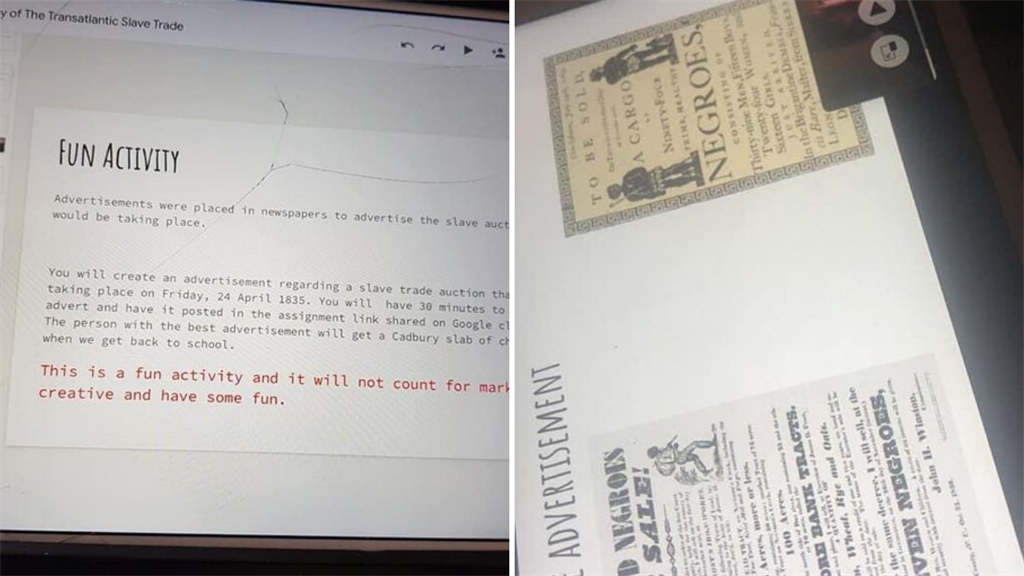


A picture of the class assignment.
- Umalusi says it does not specify what the content of school based assessments should be.
- The council said this after Parklands College and Midstream College had similar assignments on slavery.
- A Cape Town school teacher will now be undergoing sensitivity training after giving out the assignment which offended parents.
Quality assurance education body Umalusi says it is of the view that topics focused on past injustices should be dealt and approached with sensitivity at schools.
The council made the statement in the wake of criticism levelled against Cape Town school, Parklands College earlier this week after Grade 7 pupils were asked to make a poster advertising a slave auction in the 1800s as a “fun activity” in history class.
The assessment was criticised and shared on social media platforms resulting in the school apologising.
According to the assignment – titled “Fun Activity” – pupils were given the following instructions:
“You will create an advertisement regarding a slave trade auction that will be taking place on Friday, 24 April 1835. You will have 30 minutes to create the advert and have it posted in the assignment link shared on Google class today.”
READ HERE | Cape Town schoolteacher gives Grade 7 learners ‘slave trade auction’ activity – parents outraged
Following the Parklands College assignment it was later discovered that Midstream College in Gauteng had also given a similar assignment to its Grade 7 pupils, asking that they design a poster for an upcoming slavery auction in 1614.
The assignment was withdrawn after concerns were raised by parents, Midstream principal Carel Kriek told News24 earlier in the week.
Kriek said such topics were something schools had to do at primary level and that Midstream had removed the topic three years ago – and “Umalusi forced [the school] to put it back in our curriculum”.
But in a written reply to News24 on Wednesday, Umalusi spokesperson Lucky Ditaunyane said the council’s evaluation processes were conducted in Grades 3, 6, 9, and 12 – and not 7.
ALSO READ | Gauteng teacher, who allegedly threatened to put knee on pupils’ necks, to face hearing this week
Ditaunyane said the evaluations entailed the extent to which a school complied with the accreditation criteria – namely school ethos, leadership, management and communication, teaching and learning – and school results.
“To be accredited, a school is required to cover, as a minimum, all the requirements specified in the Curriculum and Assessment Policy Statements (CAPS), which is prescribed by the Minister of Basic Education.
“According to the CAPS, the topic of ‘Transatlantic Slave Trade’ is part of the curriculum for History in Grade 7. However, Umalusi does not specify the content of school-based assessment or the approach used by schools to assess learners on any of the topics,” said Ditaunyane.
He added that the content of the assessment was left to the school and not the council.
“Be that as it may, it is Umalusi’s considered view that topics dealing with past injustices must be approached sensitively and prudently.”
Speaking to News24 on Thursday, Kriek said the investigation into how the sensitivity of the assignment was not picked up before being distributed to parents and pupils was ongoing.
He said three years ago Umalusi was not happy that the school was not CAPS compliant in the Social Sciences subject.
Kriek said the school was not accusing Umalusi of instructing them to conduct a specific assignment but said the school was told to bring slavery topics back into the syllabus.
“It’s the topic of slavery that was put back on in the curriculum. We didn’t try to defend it (the assignment) at all, we realised it was race insensitive and apologised.
“We are investigating how we did not pick it up early enough that it is race insensitive and we only canned afterwards and that in future we always have processes in place to make sure it doesn’t happen again,” the principal said.

